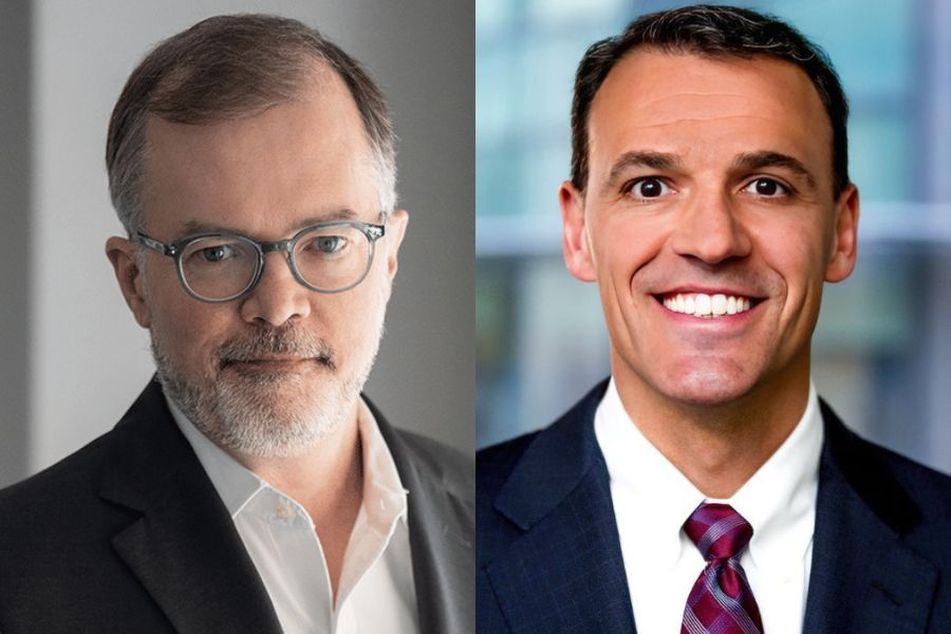Distressed investors finding opportunities despite bull market, strong economy
 Michael Moriarty, chief investment officer at Wealthspire Advisors, and George Schultze, founder of Schultze Asset Management.
Michael Moriarty, chief investment officer at Wealthspire Advisors, and George Schultze, founder of Schultze Asset Management.
"Interest rates have skyrocketed in the last 24 months and because of that, you're seeing more and more distress,” said one fund manager.
Even in a raging bull market propelled by a strong economy, some companies get left behind. Some deservedly so. Others perhaps not.
Therein lies the opportunity for distressed investors like George Schultze, founder of Schultze Asset Management, to squeeze out a profit. And when he judges the situation correctly, a handsome one.
Distressed investing traditionally involves fund managers scooping up debt at pennies on the dollar, be it bonds or loans issued by companies, betting the company or asset springs back to life. Schultze not only buys beaten-down bonds at his $75 million fund, but he also sells short the stocks of companies headed into distress. He also on occasion invests in post-distressed equities on the long side after a restructuring event, typically a bankruptcy or a debt-for-equity swap.
And for all the good news out there in the stock market and the greater economy, Schultze says the step-up in interest rates is weighing heavily on companies not resilient enough to withstand the pressure.
“Interest rates have skyrocketed in the last 24 months and because of that, you’re seeing more and more distress,” said Schultze. “According to J.P. Morgan, last year was the fourth busiest year on record for distressed debt. And so you’re seeing a lot more companies facing issues due to higher interest rates, and also due to secular change and other things that are impacting their businesses, like inflation.”
Schultze points to his investment in National CineMedia (Ticker: NCMI) shares as a prime example of his investing style. The movie advertising network went through a major bankruptcy in the wake of the pandemic, restructured all its debt and cleaned up its balance sheet.
“Now with the COVID shutdown behind us, the company has a great new opportunity for success going forward,” said Schultze.
On the flip side, Schultze scours for struggling companies where he can short the shares and profit from selling high and buying low.
“It’s really the opposite analysis,” said Schultze. “It’s fundamental analysis, but we’re looking for companies that are really challenged in their cash flow profile. They have negative cash flow, they have near-term debt maturities, and they have problems in their businesses that are starting to really surface.”
He says one area he’s been looking at lately on the short side is the electric vehicle manufacturing space, companies like Lucid and Rivian.
“They face problems and it looks like they’ll have some potential bankruptcy risk in the near future,” said Schultze.
Of course, the landmine short-sellers like Schultze must avoid is a short squeeze. During the meme stock craze, short-sellers pushed shares of distressed companies sky high, inflicting serious damage on hedge fund managers who were betting against these firms with admittedly shaky fundamentals.
Schultze, whose fund is geared for accredited or high-net-worth investors, says the key to judging short squeeze risk is to keep a keen eye on how much it costs to borrow the shares.
“It costs about 20% a year to borrow Lucid stock to short sell it, because there’s just a lot more demand to short sell it,” said Schultze. “The typical rate these days is about 4 to 5% per year. And that would be sort of a normal short. Anything more expensive than that then you have a risk of a potential short squeeze.”
Added Schultze: “Experience helps as well. Doing the fundamental analysis, knowing where the bodies lie for these companies can help you find the right ones to short.”
Ted Brooks, founder of Nordwand Capital, invests in distressed debt investments for some clients, saying they offer opportunities to generate premium return with lower correlation to the rest of the public markets.
“Many situations of distress are idiosyncratic, and the realization of return comes from resolving the company-specific distress, rather than market, industry, or macro conditions,” said Brooks.
Brooks also holds hedge funds in some client accounts that run pairs or long-short books, which utilize short-selling strategies.
“These are generally used to reduce market volatility and downside exposure by pairing off companies in the same sector to reduce the impact of market beta in a portfolio and focus instead on stock-picking alpha to generate a return,” said Brooks.
Michael Moriarty, chief investment officer at Wealthspire Advisors, also utilizes hedge funds that engage in short-selling. Nevertheless, he says he is currently not seeing much client demand for such products, perhaps due to the unfettered bull run in stocks over the past year.
He is actively searching for distressed credit fund managers as a result of his belief that the environment over the next few years could be very conducive to distressed investing.
“We advise clients to think about an allocation to a distressed manager from a portfolio standpoint. A distressed manager likely will be very complementary to traditional stocks and bonds,” said Moriarty. “That is, if the latter does poorly, that should be an environment where distressed does well and vice versa.”
Opportunities abound in real estate credit arena, says Benefit Street president
Learn more about reprints and licensing for this article.








